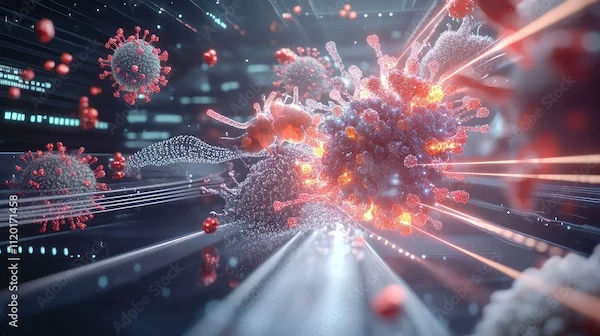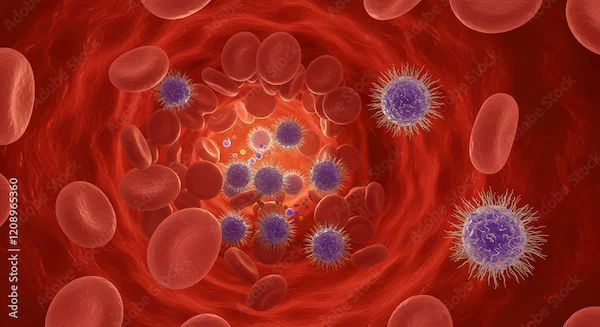How To Increase Protein Absorption?
Discover how to increase protein absorption effectively through dietary choices, digestive health, and lifestyle changes. Learn expert tips and know when to seek medical advice for better protein utilisation.

Written by Dr.Sonia Bhatt
Last updated on 16th Jul, 2025

Introduction
Protein is an essential nutrient that plays a crucial role in building and repairing muscles, supporting immune function, and maintaining overall health. However, simply consuming protein-rich foods is not enough as your body must also absorb it efficiently. If you're struggling with low energy, slow muscle recovery, or frequent illnesses, poor protein absorption could be a factor.
This article will explore how protein absorption works, why it matters, and simple ways to improve it for better health.
Understanding Protein Absorption
Protein absorption refers to how well your body breaks down dietary protein into amino acids, the building blocks of protein, and absorbs them into the bloodstream. If absorption is poor, you may not get the full benefits of the protein you consume.
1. Why Is Protein Absorption Important?
Here’s why proper protein absorption is essential for your body’s overall function:
Muscle Growth & Repair – Amino acids help rebuild muscle tissues after exercise or injury.
Enzyme & Hormone Production – Proteins are needed for digestion, metabolism, and other vital functions.
Immune Support – Antibodies, that help fight infections, are made of proteins.
Energy & Satiety – Protein keeps you full longer and provides steady energy.
2. Common Signs of Poor Protein Absorption
Watch for these signs:
Frequent muscle weakness or cramps
Slow recovery after workouts
Brittle hair and nails
Fatigue and low energy
Frequent infections
3. Factors That Affect Protein Absorption
Several factors influence how well your body absorbs protein:
1. Digestive Health
Low stomach acid or digestive enzymes can reduce protein breakdown.
Gut issues like IBS, leaky gut, or infections may impair absorption.
2. Type of Protein
Animal proteins like eggs, meat or fish are more easily absorbed than plant proteins.
Plant proteins such as beans, lentils and nuts may need combining sources, such as rice and dal, for better absorption.
3. Cooking Methods
Overcooking can denature proteins, making them harder to digest.
Light cooking (steaming, poaching) preserves protein quality.
4. Meal Timing & Combination
Eating protein with fibre or healthy fats slows digestion but improves absorption.
Spreading protein intake throughout the day is better than one large meal.
5. Age & Metabolism
Older adults may produce fewer digestive enzymes, reducing absorption.
Metabolic conditions like diabetes or thyroid issues can affect protein processing.
Consult Top Doctors for Your Symptoms
How to Increase Protein Absorption
Here are practical ways to enhance your body’s protein absorption:
1. Improve Digestive Health
Chew Thoroughly – Breaking down food well helps digestion.
Probiotics & Fermented Foods – Yoghurt, kefir, and kimchi support gut health.
Digestive Enzymes – Supplements like bromelain from pineapple or papain from papaya can help.
2. Choose High-Quality Protein Sources
Animal-Based: Eggs, chicken, fish, and lean meats which are highly bioavailable.
Plant-Based: Quinoa, tofu, lentils, and chickpeas can be combined with grains for complete proteins.
Protein Powder: Whey or pea proteins are good for quick absorption post-workout.
3. Pair Protein with Digestive Boosters
Vitamin C in bell peppers and citrus fruits helps absorb plant-based iron, improving protein utilisation.
Healthy Fats from avocado and nuts slow digestion, allowing better absorption.
Excessive Fibre at the Same Meal can hinder protein breakdown.
4. Optimise Cooking Methods
Avoid charring or deep-frying proteins.
Lightly cook eggs (soft-boiled or poached), steam fish, or slow-cook meats for easier digestion.
5. Stay Hydrated
Water helps transport nutrients, including amino acids, through the body.
6. Manage Stress & Sleep Well
Chronic stress reduces stomach acid, impairing digestion.
Deep sleep supports muscle repair and protein synthesis.
7. Consider Supplements (If Needed)
HCl Supplements for low stomach acid, only under medical supervision.
Enzyme Supplements to support digestion, if needed.
When to Seek Medical Advice
If you experience persistent digestive issues (bloating, diarrhoea, constipation) or signs of protein deficiency (hair loss, swelling, fatigue), consult a doctor. Conditions like celiac disease, Crohn’s, or pancreatic insufficiency may need medical treatment.
Final Thoughts
Improving protein absorption can enhance muscle strength, energy levels, and overall well-being. By making small changes—like eating digestive-friendly foods, combining proteins wisely, and maintaining gut health—you can maximise the benefits of your protein intake.
If you're unsure about your protein needs or digestion, consider booking a consultation with a specialist through Apollo 24|7 for personalised advice.
Consult Top Gastroenterologists
Consult Top Doctors for Your Symptoms

Dr Harish K C
Gastroenterology/gi Medicine Specialist
15 Years • MBBS MD DM MRCP(UK) (SCE-Gastroenterology and Hepatology)
Bangalore
Manipal Hospital, Bangalore

Dr Rohit Sureka
Gastroenterology/gi Medicine Specialist
19 Years • MBBS, DNB General Medicine, DNB Gastroenterology
Jaipur
Triveni Gastro Care, Jaipur

Dr. Paramesh K N
Gastroenterology/gi Medicine Specialist
16 Years • MBBS, MS ( General Surgery), DNB ( Surgical Gastroenterology)
Hyderabad
Sprint Diagnostics Centre, Hyderabad
Dr. Vijay Rai
Gastroenterology/gi Medicine Specialist
19 Years • MBBS,MD General Medicine,MD GASTROENTOLOGY
Kolkata
Livgastro, Kolkata

Dr. Gorantla Sarath Chandra
Gastroenterology/gi Medicine Specialist
15 Years • MD, DM (Gastro)
Hyderabad
Star Hospital, Financial District, Hyderabad
(225+ Patients)
Consult Top Gastroenterologists

Dr Harish K C
Gastroenterology/gi Medicine Specialist
15 Years • MBBS MD DM MRCP(UK) (SCE-Gastroenterology and Hepatology)
Bangalore
Manipal Hospital, Bangalore

Dr Rohit Sureka
Gastroenterology/gi Medicine Specialist
19 Years • MBBS, DNB General Medicine, DNB Gastroenterology
Jaipur
Triveni Gastro Care, Jaipur

Dr. Paramesh K N
Gastroenterology/gi Medicine Specialist
16 Years • MBBS, MS ( General Surgery), DNB ( Surgical Gastroenterology)
Hyderabad
Sprint Diagnostics Centre, Hyderabad
Dr. Vijay Rai
Gastroenterology/gi Medicine Specialist
19 Years • MBBS,MD General Medicine,MD GASTROENTOLOGY
Kolkata
Livgastro, Kolkata

Dr. Gorantla Sarath Chandra
Gastroenterology/gi Medicine Specialist
15 Years • MD, DM (Gastro)
Hyderabad
Star Hospital, Financial District, Hyderabad
(225+ Patients)

